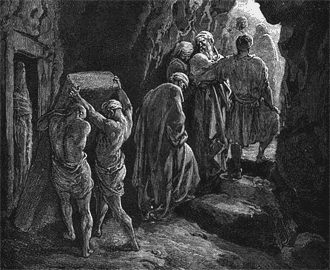Sunday, July 09, 2006
These All Died in Faith (Genesis 23-25)

Sarah dies in Hebron, at the ripe old age of 127. After all this time Abraham is still just a drifter in Canaan: he doesn’t even own a plot of ground to burry his wife. Rather than bury her back in Heran, he buys a cave near Hebron and buries Sarah there. This in itself is an act of faith – that God will give to his descendents the land of Canaan. To the end of his life Abraham only owns this tiny little plot, but he holds onto God’s promise.
Abraham is old now, and he sends his servant back to his relatives to look for a wife for Isaac. Abraham is vehement both that Isaac not marry a Canaanite, and that he not settle outside of Canaan. Both of those options would undermine the promise. To this end, his servant sets out for Mesopotamia to find a girl for Isaac.
The servant sets out a sign for the Lord: the girl that waters his camels without being asked is the one for Isaac. As in Sodom, the key test of righteousness is hospitality. Rebekah is the one. The servant negotiates with her father, with her brother Laben, and (shockingly) he even asks Rebekah. She agrees, and, the very next day, leaves her family and all she knows to marry a man she’s never met living in a land where he himself is a foreigner. Rebekah’s attitude reminds me a bit of Abraham. The Lord knows what he likes, and Isaac doesn’t complain. He loves Rebekah, and is “comforted after his mother’s death.”
Then Abraham goes and marries another wife, bears a bunch of children, and sends them eastward to be away from Isaac. How strange! Why add to the promise after all that has happened? Some of the names, like Midian and Asshurim, have an ominous tone.
Finally Abraham dies, and Isaac and Ishmael burry him with Sarah east of Mamre (where he met the angel of the Lord). Though he leaves Isaac with all he has, Abraham dies with no more of the land in his possession than the cave he lays in. What has this giant of a man to show for after his long life? What has he accomplished? The birth of a son? That’s been done before. Abraham’s great accomplishment is an unwavering trust in God to be faithful to his promise, even after he himself is dead and gone.
Comments:
<< Home
Well gosh, Doug, thanks! I must say this Bible-blogging is probably a bit dangerous...creating the illusion that I actually know what I'm talking about and foisting that impression onto the web. But I hope you can sift some good stuff from my posts. Just be sure to call me on stuff if I'm outa line. I need the accountability (and, to be fair, love the discussion).
This isn't really the "right" place to post this, but here's a sermon that does much of what you're trying to do...regarding an Abram story. Thought you might like it... http://www.sbcrc.org/sermons/2006.07.02.html
That's really good, Catherine. More than I could deduce from the story of Abram and Sarai in Egypt, but definately along the same lines. By the way, if you want to post a link, just put it inside an "a" HTML tag using the "href" attribute.
Interesting remark, that the mark of righteousness was hospitality. Maybe we need to take that to heart.
I always appreciated Rebekah's willingness to leave everything and go with the servant. She seems like a woman with spunk and faith and guts.
I always appreciated Rebekah's willingness to leave everything and go with the servant. She seems like a woman with spunk and faith and guts.
I've always been a bit mystified about Abraham remarrying after Sarah's death, and the resulting nations which ended up being enemies of Israel. Would have been better if he had just lived out his old age in celebesy. Israel's worst enemies in OT times and now, are the result of Abraham's weakness.
"We have met the enemy, and he is us."
Post a Comment
"We have met the enemy, and he is us."
<< Home
Home
Who is Oyarsa?
Contact Me
Blog the Bible
Recent Comments
Archives
- June 2006
- July 2006
- August 2006
- September 2006
- October 2006
- November 2006
- December 2006
- January 2007
- February 2007
- March 2007
- April 2007
- May 2007
- June 2007
- July 2007
- August 2007
- September 2007
- October 2007
- November 2007
- December 2007
- January 2008
- February 2008
- March 2008
- April 2008
- May 2008
- June 2008
- July 2008
- September 2008
- October 2008
- November 2008
- July 2009
- August 2009
- January 2010
- August 2010
Recommended Books

